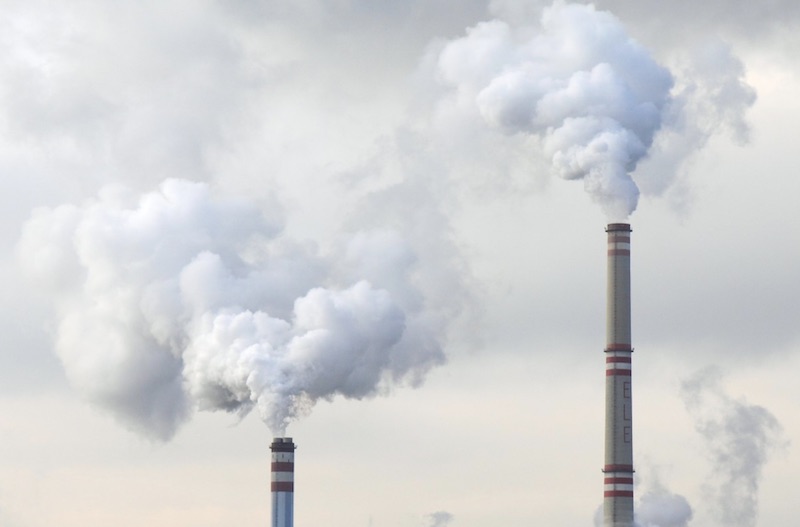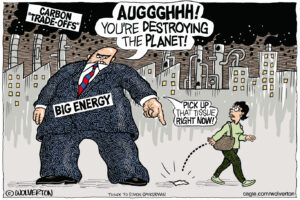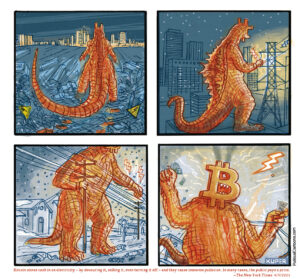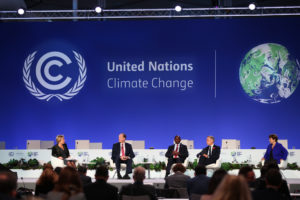Food & Water Watch: Carbon Tax Is a Sham
A legal expert who's made it his business to take on corporatism warns against market-based solutions to environmental problems. pxhere.com
pxhere.com
I spoke to Scott Edwards, the legal chief at Food & Water Watch, in order to discuss the activism of an organization with a name that defines why they’re so important in the modern world. Edwards is a lawyer who has spent his career fighting against the corruption that has festered in our system, in which corporations work to deceive the public and decrease their costs by polluting our environment.
In this interview, he talks about why so many on the left have fallen for the “carbon tax” sham, and why so many of our laws end up written by corporate lawyers trying to enrich their companies.
An excerpt from our interview follows below:
Lee Camp: A lot of the future is definitely being written by lawyers. Do you feel the best tactic to fight corporate destruction is in the courts? Or do you feel that it is just one of the tools in the toolbox?
Scott Edwards: It’s a tactic. The ultimate goal is to build the political power and to force our elected officials to represent the needs of people instead of the needs of corporations.
When you say that it’s lawyers that are writing these laws and policies they mean, more specifically, that it’s industry lawyers who’re writing these laws and policies today. Whether you’re talking about legislation around climate, food systems or water protection laws, the drafters are people from Monsanto, from ExxonMobil, from all the big industry groups.
All the big corporate lawyers who are actually writing our laws today are, obviously, doing it in a way that benefits their clients and makes them lots of money.
LC: You mentioned ExxonMobil. Obviously climate change is one of the most pressing issues of our time. We’ve got the fires in California which were unprecedented, until next year when those will be “unprecedented.” Every year we hear that and and I feel like climate change is quickly becoming almost the only issue that matters, and clearly the answer to climate change — as we’ve been told by so many of our politicians — is a carbon tax. It’s going to fix everything, correct?
SE: No that’s not correct. Sadly you see a lot of the progressive movement in this country attaching itself to a carbon tax and going around talking about these market-based systems and the logic of, “let’s just stick a price on everything and the marketplace will take care of it.” It is not a solution to climate change.
Ironically, the people who came up with a carbon tax back in 2007 were from ExxonMobil and they were working with libertarians in this country. They understand that if you just stick a price on carbon — and you know they’re talking about $30 a ton, or $20 a ton, or $50 a ton, whatever it is — that’s just a tax on consumers. So for example, you stick a $50 a ton carbon tax on it and that means when I go to the gas pump I’m going to pay 50 cents more per gallon of gasoline.
The notion that paying a little bit more for gas is a solution to our climate problem isn’t based in any kind of reality. For example two years ago I was in New York paying almost $2 more for a gallon of gas than I am today. And people weren’t driving less, they weren’t pulling off from the gas station leaving their cars unfilled. We’ve seen the British Columbia carbon tax that has been in place for years now with no reductions in greenhouse gas emissions. [Carbon tax] is an industry tool that’s used to avoid regulation and that’s all it is. It’s business as usual for them.
LC: It’s always interesting when these ideas are created by the corporations and then they’re kind of laundered through a progressive think tank, and we don’t realize it’s an ExxonMobil idea that’s being shoved down our throats.
While we’re on the topic of climate change, a lot of people don’t realize that it’s not only fossil fuels that’re causing it. It’s also animal agriculture, which in a lot of ways may be the number one cause of climate change because of deforestation, ocean dead zones, species extinction, the list goes on. A recent report that was actually covered by the the mainstream media said we have to decrease our meat-eating by 90% to keep this planet livable. You’ve been going up against industrial farming outfits as well, right?
SE: Oh yeah! It’s a big part of our work. Just like our energy system is fundamentally broken, our food system is fundamentally broken. You’ve got companies like Smithfield, Perdue, and Tyson — these big meat conglomerates – that are creating a lot of our policies around farming.
Monsanto is certainly involved on the crop side. And it is a fundamentally broken system that’s having lots of adverse impacts. One of them is climate. We also have way too many domesticated animals packed into what we call factory farms, or Concentrated Animal Feeding Operations (CAFOs). They hold massive numbers of animals but make no effort to really control the waste that they produce, the impacts on water, or the greenhouse gas emissions that are coming out of them.
So we need to fundamentally shift our meat production system and our crop production system in this country. It’s not so that we can keep feeding everybody. We will continue to feed everybody and feed them good food, but we can’t continue down the road that we’ve been on for the last several decades.
LC: We have plenty of food, we throw out something like forty percent of it.
You mentioned the factory farming or CAFOs, I think that’s the legal term. I like to call it “torture farming,” but I know that maybe you’re not allowed to use the advanced rhetoric that I get to use. Ha. Talk about some of the victories you’ve had at Food & Water Watch, such as beating Trump’s plan to slash the EPA or keeping Atlantic City’s water public. You guys have had a lot of big victories.
SE: It’s a daily battle, and you win some and you lose some. We have certainly won some important fights over the years. I think some of the biggest fights we’ve won are around fracking. We got a fracking ban in place a few years back, something that we were told we would never be able to do. We recently replicated that in Maryland with a Republican governor signing off on a fracking ban. Those were two big energy campaigns we’ve worked on.
Also, as you mentioned, we fought off water privatization efforts around the country. We worked very closely with the folks in Atlantic City to stop their water system being taken over by private companies. We are certainly fighting global trade agreements. That has been a big effort in the past several years for us and we’ve had success there.
The Trump budget cuts will be an ongoing battle. There’s no doubt that he will try to cut the budgets to things like renewable energy programs and other programs that he thinks are not worth having around. That will be an ongoing fight and it’s important in my line of work — with all we’re up against from corporate America, with the bought and paid for politicians that we oppose all the time — to look back at the victories that we do have and appreciate them.
LC: A lot of people don’t realize but trade deals tend to be decided by corporate lawyers and lobbyists, and they’re usually just corporate giveaways. Even what has come out so far about Trump’s changes to NAFTA don’t appear to be any different than the normal corporate giveaways.
SE: These trade deals are all structured to increase profits for corporations and for industries to take advantage of cheap labor, to undercut and undermine any kinds of environmental protections. They’re all structured in a way in which working-class, middle-class people will ultimately pay the price while corporate America and and the wealthy continue to reap all the benefits of these trade agreements. They’re not being structured in a way that benefits us at all.
LC: Food & Water Watch has also stood up to GMO crops and animals. What do you say to people who insist that GMOs are safe completely across the board — they need no more testing, and anyone who says otherwise is a tinfoil hat wearing paranoid?
SE: I would say that anybody who believes that is actually just buying into a government agency line that’s being fed to them without really thinking through what this might mean. There can be a big debate about whether there’s a proper amount of testing done or not. I can tell you that the GMO approval process is extremely streamlined. There’s very little testing that’s going on, particularly for the long-term impacts of any GMO.
But what’s perhaps most offensive about this whole GMO battle, and this is an indicator of how wrong it is and that the testing isn’t being done, is that you have these companies like Monsanto that are fighting so strenuously to not even let people know that their food contains GMOs. So the whole labeling debate where you’ve got all these people in this country simply saying, “Ok, you want to produce GMO food, at least label the things so that as consumers we can make these choices.” And you’ve got Monsanto working with bought-and-paid-for politicians who are shutting down the rights of consumers to know even what they’re eating anymore. And again, that’s a huge red flag for what they really know about what GMOs are and what they do and the lack of testing that’s happening with with that industry.
—
Check out Lee Camp’s new stand-up comedy special only at LeeCampComedySpecial.com. Ten percent of the proceeds will go to Food & Water Watch and Veterans For Peace.
Your support matters…
Independent journalism is under threat and overshadowed by heavily funded mainstream media.
You can help level the playing field. Become a member.
Your tax-deductible contribution keeps us digging beneath the headlines to give you thought-provoking, investigative reporting and analysis that unearths what's really happening- without compromise.
Give today to support our courageous, independent journalists.






You need to be a supporter to comment.
There are currently no responses to this article.
Be the first to respond.